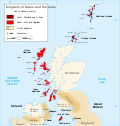Scotland
Scotland is a country that is part of the United Kingdom. It covers the northern third of the island of Great Britain, with a border with England to the southeast, and is surrounded by the Atlantic Ocean to the north and west, the North Sea to the northeast, the Irish Sea to the south, and more than 790 islands, including the Northern Isles and the Hebrides.
Etymology[edit]
The name "Scotland" derives from the Latin Scotia, land of the Scots, a Celtic people from Ireland who settled on the west coast of Great Britain about the 5th century AD. The name Caledonia has often been applied to Scotland, especially in poetry. It is derived from Caledonii, an old Latin name for a group of tribes in the northern part of what is now Scotland.
Geography[edit]
Scotland comprises the northern third of the island of Great Britain, off the coast of North West Europe. The total area is 78,772 km² (30,414 sq mi), comparable to the size of the Czech Republic. Scotland's only land border is with England, and runs for 96 kilometres (60 mi) between the basin of the River Tweed on the east coast and the Solway Firth in the west.
History[edit]
The History of Scotland is known to have begun by the end of the last glacial period (in the paleolithic), roughly 10,000 years ago. Prehistoric Scotland entered the Neolithic Era about 4000 BC, the Bronze Age about 2000 BC, and the Iron Age around 700 BC.
Culture[edit]
Scotland has a rich culture which has been shaped by its history, geography and people. This includes its music, literature, sport, food, drink, social activities and festivals.
Economy[edit]
The Economy of Scotland is the 43rd largest in the world with an estimated nominal gross domestic product (GDP) of up to £152 billion in 2015. Scotland has a mixed economy closely linked with the rest of the UK and the wider world.
Education[edit]
Education in Scotland is overseen by the Scottish Government and has a history of universal provision of public education, and the Scottish education system is distinctly different from those in the other countries of the United Kingdom.
Politics[edit]
Politics of Scotland operates within the framework of a devolved parliamentary democracy, whereby Scotland is a constituent nation of the United Kingdom, and the Scottish Parliament has a range of devolved powers over areas such as health, education and the environment.
-
Skara Brae
-
Callanish at Sunset
-
Early Medieval Scotland Areas
-
Kingdom of Mann and the Isles
-
Court of Session 1532 James V
-
Wallace Monument, Stirling, Scotland, in Autumn
-
James VI and I, King of Scotland and England
-
Treaty of Union
-
James First Earl of Seafield
-
Portrait of Sir Walter Scott
-
Bagpiper Battle of Bazentin Ridge
Ad. Transform your life with W8MD's Budget GLP-1 injections from $75


W8MD offers a medical weight loss program to lose weight in Philadelphia. Our physician-supervised medical weight loss provides:
- Weight loss injections in NYC (generic and brand names):
- Zepbound / Mounjaro, Wegovy / Ozempic, Saxenda
- Most insurances accepted or discounted self-pay rates. We will obtain insurance prior authorizations if needed.
- Generic GLP1 weight loss injections from $75 for the starting dose.
- Also offer prescription weight loss medications including Phentermine, Qsymia, Diethylpropion, Contrave etc.
NYC weight loss doctor appointmentsNYC weight loss doctor appointments
Start your NYC weight loss journey today at our NYC medical weight loss and Philadelphia medical weight loss clinics.
- Call 718-946-5500 to lose weight in NYC or for medical weight loss in Philadelphia 215-676-2334.
- Tags:NYC medical weight loss, Philadelphia lose weight Zepbound NYC, Budget GLP1 weight loss injections, Wegovy Philadelphia, Wegovy NYC, Philadelphia medical weight loss, Brookly weight loss and Wegovy NYC
|
WikiMD's Wellness Encyclopedia |
| Let Food Be Thy Medicine Medicine Thy Food - Hippocrates |
Medical Disclaimer: WikiMD is not a substitute for professional medical advice. The information on WikiMD is provided as an information resource only, may be incorrect, outdated or misleading, and is not to be used or relied on for any diagnostic or treatment purposes. Please consult your health care provider before making any healthcare decisions or for guidance about a specific medical condition. WikiMD expressly disclaims responsibility, and shall have no liability, for any damages, loss, injury, or liability whatsoever suffered as a result of your reliance on the information contained in this site. By visiting this site you agree to the foregoing terms and conditions, which may from time to time be changed or supplemented by WikiMD. If you do not agree to the foregoing terms and conditions, you should not enter or use this site. See full disclaimer.
Credits:Most images are courtesy of Wikimedia commons, and templates, categories Wikipedia, licensed under CC BY SA or similar.
Translate this page: - East Asian
中文,
日本,
한국어,
South Asian
हिन्दी,
தமிழ்,
తెలుగు,
Urdu,
ಕನ್ನಡ,
Southeast Asian
Indonesian,
Vietnamese,
Thai,
မြန်မာဘာသာ,
বাংলা
European
español,
Deutsch,
français,
Greek,
português do Brasil,
polski,
română,
русский,
Nederlands,
norsk,
svenska,
suomi,
Italian
Middle Eastern & African
عربى,
Turkish,
Persian,
Hebrew,
Afrikaans,
isiZulu,
Kiswahili,
Other
Bulgarian,
Hungarian,
Czech,
Swedish,
മലയാളം,
मराठी,
ਪੰਜਾਬੀ,
ગુજરાતી,
Portuguese,
Ukrainian








